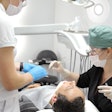Vaccinating through salivary glands may provide protection against a wide range of diseases, according to new research in the Journal of the Federation of American Societies for Experimental Biology (February 9, 2011).
"Our work highlights the ability of the salivary glands to act as an alternative mucosal route for administering vaccines, which would lead to protective immune responses both locally and systemically," said Lucille London, PhD, an associate professor of oral biology and pathology at Stony Brook University and a study co-author. "Thus, in the future, salivary gland inoculation may become a clinically acceptable method in which to vaccinate groups of individuals against new and emerging pathogenic challenges."
To make this advance, the researchers studied two groups of mice. The first group received live cytomegalovirus directly into their salivary glands. These mice demonstrated an immune response in the salivary glands, and the researchers observed an increase in the number and types of cells associated with antibodies that were protective in the saliva. Importantly, these antibodies were also found in other mucosal secretions and in the serum of these mice, suggesting that these proteins spread to other locations in the body.
Additionally, the researchers observed structural and functional changes in the immunized salivary glands, causing them to resemble lymph node-like structures commonly seen in injection-based immunizations.
The second group of mice was given an inactive virus that did not cause an infection in the salivary glands. These mice demonstrated no active immune response when compared to the first group. When both sets of mice were exposed to the same virus at a later time, only the group immunized with an active virus was protected from future infection.
This discovery opens the doors for similar research involving the use of weakened viruses to determine if they will also confer immunity through salivary glands, the researchers concluded.















